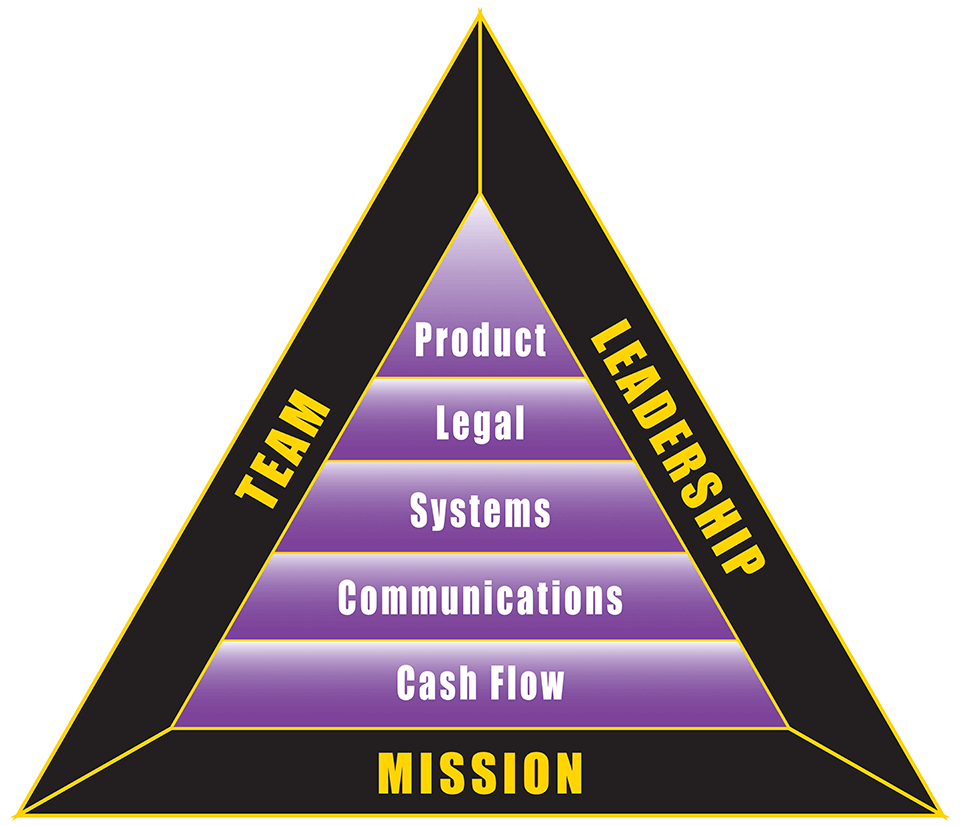Blog | Entrepreneurship
Want to Be a Successful Entrepreneur? Fail Harder
The key to winning is losing
Rich Dad Entrepreneur Team
February 17, 2023
Summary
-
No one becomes successful without taking risks
-
Embracing failure means overcoming fear
-
Focus, not balanced portfolios, is the primary driver of the rich
On a wall at the offices of advertising agency Wieden + Kennedy sits this mural:

Wieden + Kennedy (W+K) is considered one of the most innovative advertising agencies in the world. This mural contains over 100,000 plastic push pins and took over 350 hours to complete.
It was created by students who are part of a one-year, intensive, in-house school of advertising called W+K 12— a school for people who know what they want to do, run by people who know what they’re doing.
Says W+K partner, Dan Kennedy, “The background is made of pushpins. The easy way would be to do the letters as pushpins and leave the wall blank. They chose the hard way…It’s like Babe Ruth trying to hit a home run. If you miss, you miss. But at least you swung the bat as hard as you could.”
The biggest winners in life started as losers
Failure is often viewed as negative. Most people fear failure. It’s not their fault. The education system is built to discourage failure. If you take a risk and get a bad grade, they make you think you’re mortgaging your future. Conformity is the rule. Divergent thinking is frowned upon.
But the reality is that no one can be successful if they don’t take risks. And if you’re going to take risks, you’re going to fail. In the post “The Best Teacher In the World”, you’ll find some examples of very successful entrepreneurs who failed spectacularly.
-
Thomas Edison changed the world by making mistakes. He reported failing 3,000 times before inventing the electric light bulb.
-
Henry Ford went bankrupt before Ford Motor Company became a success.
-
Jeff Bezos’ Amazon-offshoot zShops failed.
-
Larry Ellison struggled for years and was on the verge of bankruptcy and mortgaging everything before Oracle took off.
-
Fred Smith received a failing grade in business school for his business plan which today is FedEx.
-
Colonel Sanders had to reinvent himself many times and found himself broke at age 65 before KFC succeeded.
When you look at that list of people, you wouldn’t think “losers”. But that’s what they were, each and everyone of them...before they were winners. They understood that the key to success is taking risks and failing before you succeed.
Want to be successful? Ask, “How can I fail harder?”
Most people try to minimize failure in their life, so they don’t take risks. Successful people don’t fear failure but understand that it’s necessary to learn and grow from. They take big risks knowing that they might fail harder than they ever have in their lives.


Of course, they might succeed more than they ever dreamed.
They’ll only know after they’ve tried.
The W+K mural it forces the question:
How can you fail harder? And why aren’t you doing it?
Embracing failure means overcoming fear
Upon reading the Rich Dad posts, you’ll know the importance of financial education. It's only through increasing your financial intelligence through financial education that you will be able to become rich. That being said, it isn't an easy path. Financial education is hard work, especially in a culture that doesn't understand or value it.
When it comes to increasing your financial intelligence, you'll inevitably come up against fear that will push you to either bear down and fight through or give up. How you respond to fear will set the course for whether you live a rich life or a poor one.
Here are five ways you can overcome fear in your life as you move down the path of wealth.
Acknowledge fear is real
Fear is real. Everyone has it. And everyone has a fear of losing money, even the rich. But it's not having fear that is a problem. It's how you handle your fear. No one likes losing, but often the dividing line between champions and perennial losers is how they handle failure when it does happen. Similarly, the primary difference between a rich person and a poor person is how they manage their fear.
You’ll likely never meet a rich person that hasn't lost money. But you’ve probably met a lot of poor people who have never lost a dime—investing that is. Poor dad was like this. He feared losing money, but rather than face his fear, he ignored it. He did nothing. He simply avoided the issue, refusing to discuss the subject. Playing it safe helped him not lose money, but he never got rich either.
Rich dad, on the other hand, said that if one wanted to be rich, they had to first acknowledge their fear and then overcome it. He said the best way to do that was to think like a Texan.
Think like a Texan
"I like Texans," rich dad said. "In Texas, everything is bigger. When Texans win, they win big. And when they lose, it's spectacular."
Robert Kiyosaki asked "Texans like losing?"
"That's not what I'm saying," said rich dad. "Nobody likes losing. Show me a happy loser, and I'll show you a loser in life. Rather, I'm talking about the Texan's attitude toward risk, reward and failure. They live big. They're proud when they win, and they brag when they lose. They have a saying, 'If you're going to go broke, go big.'"
Rich dad used the Alamo as an example of this Texan attitude. The Alamo is a story of brave people who chose to fight, even when there wasn't any hope of winning. They chose to die instead of surrendering...and they got their butts kicked. But, how did Texans handle this? They said, "Remember the Alamo!" They took a loss and made it a win.
"The Texans took a failure and turned it into inspiration...and a tourist destination that makes millions," said rich dad.
Learn from failure
"The formula for all winners," said rich dad, "is that failure inspires them to become winners because they learn from their failures."
Nobody does anything great without failing. Championship bikers had to first learn how to ride a bike, and they fell off their bikes in the process. Each time they were faced with the decision to either quit or get back on. The same is true for pro golfers. Surely they've lost many golf balls over the years. The difference between winners and losers is whether they look at failure as an opportunity to learn and grow, or as an opportunity to quit.
For winners, losing inspires them. For losers, losing defeats them.
Play to win
Former NFL quarterback, Fran Tarkenton, said, "Winning means being unafraid to lose." People like Tarkenton are not afraid of losing because they know who they are. But just because they're not afraid to lose, doesn't mean they like losing. There is a difference between hating to lose and being afraid to lose.
People who are afraid to lose never take the field, and when they do, they play not to lose rather than to win. Unfortunately, they rarely win.


People who hate losing take the field and play to win. When they do lose, they use it as inspiration to get better. It's that attitude that makes them champions. If you want to be rich, stop playing not to lose and start playing to win.
Be focused
The conventional financial wisdom is to build a balanced portfolio of stocks, bonds and mutual funds. That is a safe and sensible portfolio. It's a portfolio of someone playing not to lose rather than playing to win. And it's a portfolio that won't get you rich.
The rich don't play it safe with balanced portfolios. Rather, the rich are focused. Balanced people go nowhere. They stay in one spot. To make progress, you must be unbalanced and focused.
Thomas Edison wasn't balanced. He was focused. Bill Gates wasn't balanced. He was focused. Steve Jobs wasn't balanced. He was focused. If you have any desire to be rich, you must be focused. Do not do what the poor and middle-class do: put their few eggs in many baskets. Put a lot of your eggs in a few baskets and focus. Follow One Course Until Successful. Overcome your fear and don't play it safe.
Hedging against failure make success more likely
All of this being said, while failure is a very valuable component of success, no one wants to fail all the time. The only reason failure is valuable is because you take the lessons you can from it in order to be successful the next time. The whole point of embracing failure is so you can move from it to success.
So, while learning to embrace failure and to even fail harder...here are some tips on how to hedge against failure.
Entrepreneurial success and the B-I Triangle
People who want to be entrepreneurs often say, “I have a great idea and product. What does it take to be successful?”
Though it’s a good thing that they have a great idea and product, that’s really just the beginning. In order to be successful, you must have eight integrities, which are shown in the B-I Triangle.

The eight integrities are:
-
Mission
-
Leadership
-
Team
-
Product
-
Legal
-
Systems
-
Communications
-
Cash flow
Increase your chance of success by being a generalist
In life there are generalists and there are specialists.
Most of the world is made up of specialists. Specialists only focus on one aspect of the B-I Triangle, and because of that, they make poor entrepreneurs.
Students who graduate with a degree in product design seek jobs at the product level of the B-I Triangle. Students who graduate from law school fill roles at the legal level of the triangle. Those with degrees in engineering or computer science tend to focus on jobs at the systems level of the triangle. Students who receive degrees in marketing focus on jobs in the communication section of the B-I Triangle. And students who receive a degree in accounting typically find a job at the cashflow level of the triangle.
Successful entrepreneurs are generalists. One reason why entrepreneurs, like Steve Jobs and Bill Gates, leave school is because they did not want to be specialists; they hired specialists.
Generalists must be mission driven, have strong leadership skills, and surround themselves with a smart team, often “A” students with experience in the real world.
Why most entrepreneurs fail
There are three primary reasons why most entrepreneurs fail. They are:
-
The entrepreneur does not have all eight integrities in place. For example, most new entrepreneurs focus on product. They may have a great product, but are likely deficient in some or all of the other seven integrities.
-
The entrepreneur is a mono-professional. The saying “Birds of a feather flock together” applies here. For example, attorneys get together with other attorneys to form a business such as a law practice. Or techies get together with other techies to form a web company. Again, they may be smart professionals, but they will lack professional strength at the other seven integrities.
-
The entrepreneur lacks a sense of mission. You will recall that, among the Seven Intelligences, emotional intelligence and a sense of mission are essential in carrying an entrepreneur through the ups and downs of starting a business.
Generosity is the key to success
Contrary to popular belief, many of the most successful entrepreneurs are generous. If you look at the B-I Triangle, you will see that to start a successful business, a B-quadrant entrepreneur must provide jobs.
Most students come out of school looking for jobs. They need a job because schools don’t teach students how to satisfy one of Maslow’s basic needs, the need for Safety. That is why most “A” students work for “C” students.


Building the eight integrities takes financial education
Without financial education, many people are financially desperate, needy, and greedy. Financial education, the kind of financial education that transforms both the mind and spirit, opens our eyes to other points of view.
If you want to be an entrepreneur, you must become a generalist who hires specialists. Begin today learning about all eight integrities in the B-I Triangle and building relationships with those that specialize in each.
Most of all, focus on building your mission and finding specialists who are inspired by that mission. Being an entrepreneur is above all being generous. If you build a great company, you create great jobs for talented people, and you will solve problems for your customers and clients.
To fail harder means to try harder
Finally, remember that trying harder takes strength of character that most people simply don’t possess.
If you’re to do anything of worth in this world, it will mean that you will fail. And if you’re to do anything big in this world, it will mean that you will fail big.
Original publish date:
May 01, 2012